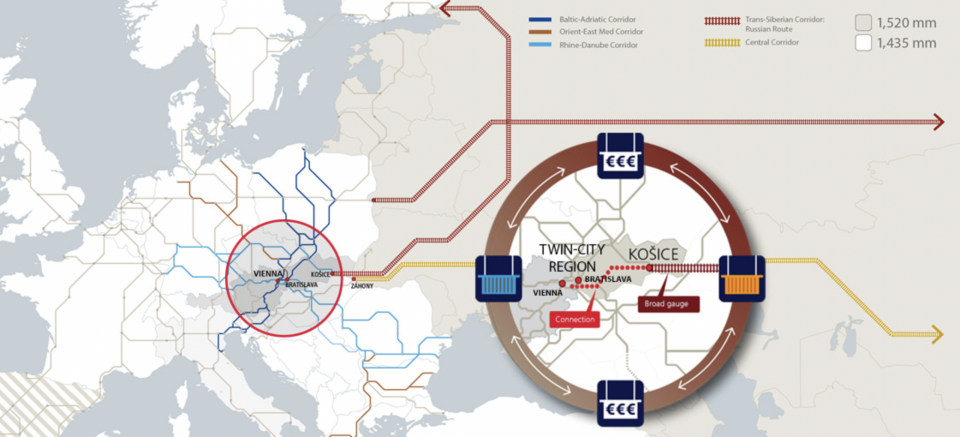Is the Kosice-Vienna line cancelled for good?

The extension of the broad gauge line (1,520 mm) between the Slovakian city of Kosice and Vienna has been on the planning table since 2008. Yet, fourteen years later, and following multiple declarations of intent and feasibility studies, the project remains stagnant. Who will benefit from it? That is the central question that remains unanswered. However, when asking if the project will become a reality, the answer is more straightforward: the odds are not in its favour.
That is so because a few weeks ago, according to Austrian media, the Austrian transport minister Leonore Gewessler rejected any possibilities of completing the project. Despite rumours that the Kosice-Vienna line extension was moving rapidly towards its implementation, this is not the case.
ÖBB-Infrastruktur, the Austrian railway company, also confirmed that “there is no prospect at the moment concerning the construction of the 1,520 mm railroad line because there is no securing by Slovakia, Ukraine and Russia, the international partners involved”.
So, who benefits?
Back in 2018, ÖBB admitted that the extension would mainly serve the Austrian economy. “An important and intermodal European freight terminal would be created on Austrian soil, analogous to the large ports, combined with new jobs and corresponding added value. The macroeconomic advantages are estimated at approximately 127,500 annual job equivalents and an added value of approximately 16 billion euros for Austria as a business location”.
On the other hand, the European Commission did not welcome the project very warmly. The project would, in effect, benefit a few companies rather than the railway sector as a whole. This is a clear breach of the single European rail transport market rules, said Maja Bakran Marcich, Deputy Director-General of the Directorate-General for Mobility and Transport (DG MOVE) back in the day.
Slovakia does not benefit
Moreover, over the years, Slovakia started losing its interest in the project gradually. The more it looked like Austria would be the only winning party, the more reluctant Slovaks has become. “I am not a friend of this idea. I always wonder what Slovakia gains from it. The unloading area is then in Vienna instead of Kosice. So the Viennese would be the only to benefit”, said Ivo Nesrovnal, Mayor of Bratislava, to the Wiener Zeitung.
Finally, it seems that the lack of interest from Slovakia’s side is the strongest statement against the project. Its indifferent stance, together with Ukraine and Russia, constitutes the project’s core problem currently and the main reason it will most probably not proceed.

The project in theory
The project’s whole point was to embrace trade and transport relations between the twin cities of Bratislava and Vienna. The twin cities find themselves at a distance of 60 kilometres and cooperate intensively when it comes to transport. For example, they have launched a dedicated ship connection through the Danube while they also have upgraded motorways connecting them. In the context of good synergy, the idea of extending the broad gauge line from Kosice to Vienna would mean better interconnectivity between the cities and countries, direct connection with the Trans-Siberian railway and respectively China.
The project would reduce CO2 emissions in Eurasian transport, open up to 17,500 job positions during construction and 3,500 full-time jobs, shorten transit times from Vladivostok to Vienna to 15 days, and provide more opportunities to countries with no direct links to seaports. However, all of these remained a theory, and despite all the agreements, studies and intent never happened. It seems that after the Austrian transport minister’s statement that the project will not be completed, an answer has been provided on whether the extension will take place. The project is considered a closed file. Even if it makes it to the surface again in the future, it will prerequisite the full collaboration and beneficial financial coexistence of all parties involved.
Also read:
- EU disapproves of broad gauge extension Bratislava-Vienna
- Tilburg to have railway link to Kaunas Intermodal Terminal
You just read one of our premium articles free of charge
Want full access? Take advantage of our exclusive offer





